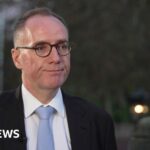Not a single measure in the government’s policy-packed Budget will change the growth forecast for the next five years – that was the damning assessment of the government’s official forecaster, the Office for Budget Reponsibility (OBR).
For a government that has declared economic growth as its top priority it is surely a disappointment.
Worse than that, although the OBR upgraded its growth forecast for this year – it downgraded them every year thereafter till 2030.
Although businesses were relieved they didn’t get clobbered the way they did at the last Budget – at which they were handed a £25bn employer national insurance hike – genuinely significant pro-business measures were thin on the ground.
Little wonder many business leaders are asking: “Where is the growth?”
Even the sectors that did get a mention as receiving special help – such as High Street retailers and hospitality – insist their costs of doing business are going to rise significantly through higher business rates and labour costs.
The government said it would calculate business rates for 750,000 High Street retail and hospitality firms using a lower percentage of the rateable value.
But at the same time many have seen their rateable value increase and face the phasing out of a Covid-era 40% discount from April.
The net result is that, despite some transitional relief, lots of them will see significant increases in their business rates bill.
An 8.5% pay rise for 18-20 year olds on the national living wage is good news for young people in work and an incentive for those who aren’t to find a job, but on top of 16.3% rise for the same group last year, it may put employers off taking on new people.
As one FTSE 100 boss told the BBC: “They are hurting the very people they are trying to help and it will mean fewer jobs, fewer hours, fewer premises, lower growth.”
The cap on salary sacrifice arrangement will hit both workers and businesses, who may reduce future pension contributions, pay rises or investment in growing their business.
One measure that got little attention but could prove important is expanding schemes that give tax breaks for investors in young companies – the Enterprise Investment Scheme and Venture Capital Trusts – and allow them to invest in companies that have grown bigger.
The OBR did give the government some credit for this.
A Treasury spokesperson said the economy was “already outperforming forecasts” and it was driving growth “with billions of pounds in new capital spending, strong private investment and bold planning reforms”.
“This Budget doubles down on our long‑term plan to grow the economy and create good jobs,” they added.
The truth is that any government or chancellor’s ability to “unleash” growth is pretty limited.
Most people just want not to be over-molested by tax and regulation and allowed to get on with their lives. On that score, this Budget is a big improvement on last year’s.
By building in a lot more wiggle room in her tax and spending plans over the next five year, Rachel Reeves has reduced the likelihood we will need such a bewildering smorgasbord of policies next year.
Stability can be a powerful fertiliser for growth.
The former chief economist of the Bank of England Andy Haldane may have over egged it by saying that the “fiscal fandango” – the months of speculation before this year’s Budget – was the single biggest reason for growth to flatline for the second half of the year, but it sure didn’t help.
Ahead of the Budget, Steve Rigby, the boss of large private company Rigby told the BBC, “we just hope [it] isn’t too catastrophic for business and we can get on with it”.
Test passed he says – but that’s a pretty low bar for a government desperate for growth.



